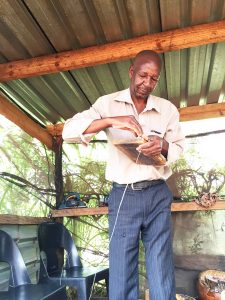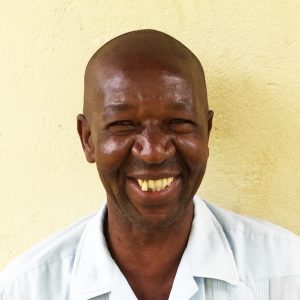Introduction
Tirivangani Chiongotere is an excellent mbira player and mbira maker. Often called by his nickname ‘Tiri’, he is known for his big smile as well as his beautiful mbira style. His instruments are made with signature orange Fanta bottletops, and have a gorgeous ringing tone and durable construction.
Buy a Tiri Chiongotere mbira on this website. See Tiri at work making mbiras.
Recordings Available From MBIRA
Use these links to go to the albums and listen to audio samples:
Biography
(based on an interview and biography by Denver Banda in 2009, edited and updated by Erica Azim)
Learning to play mbira
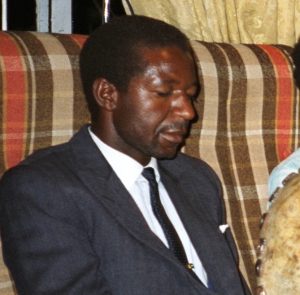
As Tiri grew up in Chiriseri Village near Bindura, the Chiongotere family were well entrenched in the traditional rites and rituals of the Shona people. Ceremonies for abundance and good seasons, and those for the departed (especially ceremonies for the unveiling of tombstones), were held dutifully and with respect to all conventions. The family did not have any mbira players, so relied on hiring musicians to help with their ceremonies. Tirivangani was the first in his family to play mbira.
Introduction to mbira
The Rhodesian Broadcasting Corporation’s African Services radio station had a popular mbira program that ran from the late 1950’s until independence. Tiri listened to the program when in grade 3.
“I was a nine year old when the mbira got into me…I remember that afternoon when the presenter was featuring the famed Mhuri yekwa Rwizi and Hakurotwi Mude was singing Nhema musasa. The mbira was very beautiful, especially Mahororo. There were mbira players in Chiriseri (Tiri’s village) but it was those two songs on that afternoon that made me fall in love with the music and the instrument.”
Learning in the village
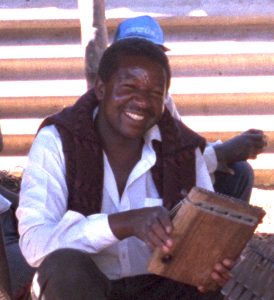
A few months after the radio program, Tirivangani’s father came home with a mbira made by Dominic Chaonza Mandere, a spirit medium in the village. Tiri’s father intended to learn but never got around to it. Tiri took the mbira and started to learn from Chartwell Dutiro family and his brothers, who lived in their neighborhood. Tiri then began to play in the Dutiros’ group.
“I remember taking the mbira he brought home and learning… When I was good at a few songs, I taught my younger brothers who were as passionate as I was about the music. As I learned from the people around me, I used to pay close attention to the way the song came out, its tempo and the keys that were struck. I tried as much as I could to be as close to what I was hearing even after being shown the right keys to hit.”
The Chiongotere elders were ecstatic to have mbira players in the family. Now they didn’t have to pay mbira players! They could plan their ceremonies at times convenient for themselves and not have accommodate the schedules of the few gwenyambira (professional mbira players), who were in great demand. The family was very impressed by young Tiri’s playing and the fact that he was also teaching his siblings. They were not very surprised about their son playing mbira because they believed that the spirits of the clan guided everything.
Learning in the city
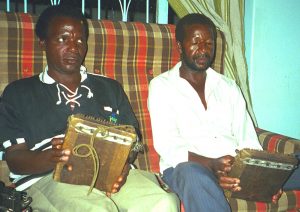
When he moved to Zimbabwe’s capitol Harare, then called Salisbury, Tiri met with his sahwira (ritual friend) Rinos ‘Simboti’ Mukuwurirwa in the suburb of Mufakose. Tiri had the “mbira playing hand” (style) of Chiriseri Village in the Bindura area, but now he met Simboti’s advanced techniques.
“I had come to stay in Harare with my cousin when I met Simboti who played mbira in a style and intensity that I had never seen. I loved this hand (style) and I wanted to learn its sweet blend of speed, advanced variations and outright complexity. I had never heard anything like this and I was hooked from the first note he played me!”
Chiongotere began to broaden his knowledge of the mbira as he learned more and more from Mukuwurirwa, and the famed Mubayiwa Bandambira’s son Gwengwe, who taught him many pieces. The combination of Tiri and Rinos worked well because Tiri was quick to learn the variations and tried to play as well as his mentor. The experience of playing at ceremonies with Simboti honed Chiongotere’s style to match that Simboti used when playing with Mubayiwa Bandambira and his son.
Playing mbira
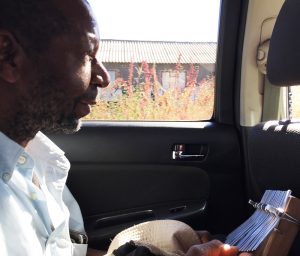
Chiongotere keeps his mbira with him wherever he goes and he calls it his closest companion. Playing mbira fits well with his work as a driver.
“In the transport business you spend a lot of time on the road and if you are not on the road, you are waiting for passengers. It is during these periods when I am waiting for passengers that I have lots of time to play mbira.”
Tirivangani noted that one used to be make a living from playing mbira if one had the time to pursue the music as a career. For him, the proceeds that come to him from mbira playing are an added bonus that supplements his income from driving.
There is an unwritten code of ethics and behavior for professional mbira players, and Tiri puts purity in sexual relations at the forefront.
“When you are doing this (playing mbira in ceremonies) you should not have one foot in the home and the other outside the home because that really angers the spirits, and their retribution will come in many ways. You have to be careful with your sexual relations because you are an integral cog in the machine that brings the spirits, and in the system of worship. If a catalyst like the gwenyambira is unclean, the whole ceremony and its importance are eroded by such conduct.”
Chiongotere is comfortable playing either kushaura or kutsinhira and believes that a mbira player should be at ease with both parts of a song. He contends that if one is not good at both parts, they have to be exceptionally good at one of the two. The rationale behind this is that a song has to be complete with both players being comfortable and confident about what they are doing.
“There should be consensus and unity of purpose when playing. I communicate with my mbira partner about the best possible variation and direction to take when playing. He may be good at kushaura on a particular song and I can be good on another and vice versa. What we have to do now is to be on the same wavelength when we play. One has to stick on what they know best. Once you do that, the piece comes out naturally.”
When Simboti and Tiri are paid for playing mbira, they share what they receive equally. Both believe that for the ceremony and participants to enjoy themselves and pray, and the ceremony be successful, it takes both mbira players to together create what is required.
Mbira in the village and the city
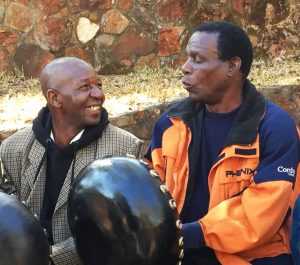
Chiongotere says that there is a difference among the playing styles that one encounters when moving to the city from the rural areas. One has to be very careful about what he or she chooses to learn because there is a danger of learning styles that are watered down. Chiongotere says that he decided to learn from Simboti because his style is very old and has depth. In the same vein, he tries to safeguard the style he learned from the erosion that traditional mbira is facing from less complex contemporary mbira playing styles.
“I want to stay true to the way I was taught because it is the right thing to do. That is one of the reasons why I love playing with Simboti. Contemporary mbira is for those who love a quick buck. I do not think I can play that because I love mbira that is well grounded. The old ways are good because pasichigare hapana kurenguka (the traditional mbira is not shallow). When you play for spirit mediums, there has to be a difference between fun and the profundity of prayer, and our old style of mbira is not just for fun.”
Obstacles for the mbira player
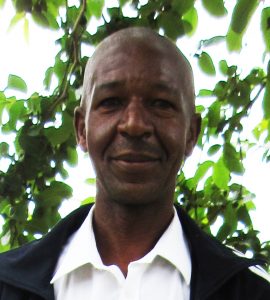
Tiri meets those who disapprove of mbira playing, but he says,
“Lack of knowledge and prejudice are the biggest obstacles that mbira music and the culture are facing. From the day we are born, all of us have talents… Despising someone on the basis of his or her beliefs, which are sustaining him or her, is wrong. Over the years, I have seen a tendency of people who just criticize a system of beliefs they know nothing about. In this case, if I practice traditional religion and I am blessed following it, they will still be unhappy or jealous because they have no understanding whatsoever and they do not even want to take the time to know what is really going on. In a nutshell, I would rather keep doing what I am about and not worry about what the others are saying because it is futile to convince someone who has their own staunch beliefs.”
Mbira is a traditional instrument that has been around for millennia and its importance should not be diminished just because one doesn’t understand the context in which it is used. Tiri says this is what he would like to inform those who do not know anything about the mbira. He said that knowing where, when, why and by whom the mbira is used is the first step to understanding the culture and the music.
Mbira making
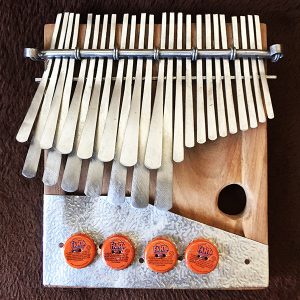
In March 2008, Tiri began making mbira instruments under the instruction of his mentor Rinos Mukuwurirwa. The mbiras that he makes are similar in construction to those Simboti makes, though Tiri’s are a little lighter weight and have Fanta bottletops. When making the keys, Chiongotere considers carefully their arrangement, sound, and durability. He also requires excellent wood quality and a very specific style of construction including the mounting of the keys.
Personal History
Tirivangani Chiongotere was born on the 27th of August 1960 at Chiriseri village on the outskirts of the farming town of Bindura. His mother is of the Mhofu Yekwa Hwata totem and his father is of the Shava Mufakose Yekwa Zumba totem. Chiongotere is the oldest of five.
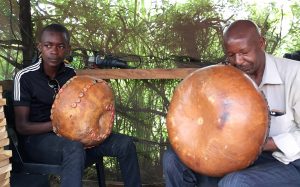
Tiri attended Chiriseri Primary School from 1967 to 1973, very close to his home. Like many of his generation, Tiri failed to advance to high school because of the liberation struggle, which saw many schools suspending operations, especially in rural communities within combat zones. Bindura is a farming area with many commercial farms, so was a constant target. Freedom fighters recruited from the disgruntled labor force and received support from the villages on the fringes of the white farming communities in the area. Chiongotere moved to Harare after schools closed.
Living in the Mufakose suburb of Harare, Tirivangani continued his education through correspondence courses that were easily available. To pay for his tuition and board, Chiongotere became an enthusiastic independent trader at Mbare Musika (Zimbabwe’s largest market) who specialized in fresh vegetables. After independence, Tiri managed to get a driver’s license. From the early 1980s to the present, Tirivangani has worked as a driver of many types of commuter vehicles. He currently lives in Norton and works as a school bus driver.
Tiri is married and has 3 sons, one daughter, and 3 grandchildren. His family enjoys mbira with him, and he likes to play mbira with Sonny, his third son. His other sons now live in the United Kingdom and New Zealand.
